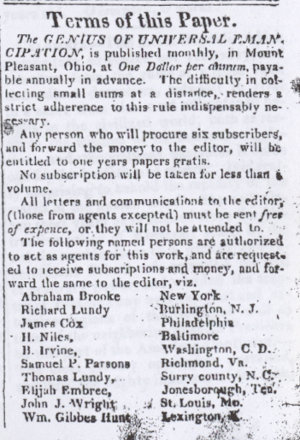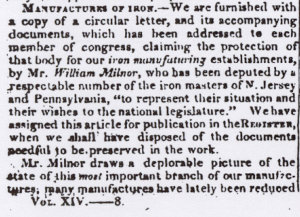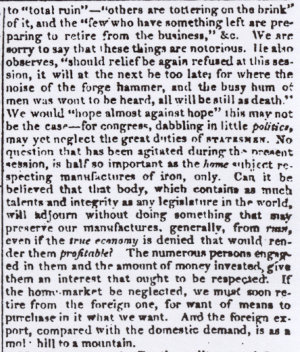Benjamin Lundy was the editor of the anti-slavery newspaper The Genius of Universal Emancipation He was the successor to Elihu Embree who had, in the year preceding his untimely death, published the Manumission Intelligencer and the Emancipator, the first ant-slavery newspapers.
Lundy was supported by the Efforts of Elijah Embree, one of his first subscription agents, and Thomas Embree, father of Elihu and Elijah, who arranged for Lundy to use the printing press. Lundy acknowledged his debt to Elihu in his "Address to the Public," the first article in the first issue of the newspaper:
The Genius of Universal Emancipation is designed to rise, like a Phenix [sic], from the ashes of the late "Emancipator, published at Jonesborough, in Tennessee, by Elihu Embree. Had that worthy man still lived to extend his useful labours, it is not likely that this paper would have appeared at this time; but as it hath please the Almighty Disposer of events to call him from works to rewards, and as there does not appear to be a prospect of a continuance of the Emancipator, it is hoped that this work may supply its place.
The Embree family, Thomas, Elihu, and Elijah, operated one of the largest iron works in East Tennessee. It was almost certainly the political resentment of the slave-state Congressmen voting against the rise in the tariff on imported iron that motivated their crusade against slavery. Elihu Embree himself owned slaves.
Lundy printed in full James Tallmadge's February 16, 1819 anti-slavery speech the House of Representatives. Tallmadge led the presentation of petitions for an increase in the tariffs on iron. Senators of the slave states demanded and got a lower tariff than the iron interests wanted.
The following is Lundy's first listing of the subscription agents for The Genius of Universal Emancipation newspaper:

The common interest among Lundy's subscription agents is the iron industry that regarded slave-state Congressmen as their bitter political enemy.
Hezekiah Niles was unquestionably the most important of Lundy's agents. He was the editor of the nation's leading pro-tariff newspaper, the Niles Weekly Register. The Register was probably the most influential newspaper in the nation at the time. Many country newspapers followed its political lead and reprinted its articles.
Niles was urgently concerned with the sinking prosperity of the iron industry which he regarded as the nation's "most important." Following is his article concerning the industry immediately prior to the disappointing Senate vote reducing the duty on iron in bolts and bars. Niles was a rabid advocate of the protective tariff.



A search through the issues of Niles' Weekly Register will reveal a wealth of pro-tariff argument.
Subscription agent Samuel P. Parsons was undoubtedly Samuel Pleasants Parsons, a Richmond, Virginia, manufacturer of iron farm implements and wagons.
Elijah Embree was an East Tennessee iron manufacturer and brother of Elihu Embree. The firm floated its iron castings on boats down the Tennesse and Mississippi Rivers as far as New Orleans.
James Cox of Philadelphia was probably the same James Cox who manufactured iron stoves and furnaces. In 1834, James Cox of Philadelphia patented an iron fireplace for cooking and for warming apartments. The editor of the Journal of the Franklin Institute remarked that it had a decided advantage over prior designs that warmed the air in the room from waste heat of the fire. He is possibly the same James Cox who was later the President of the Lehigh Coal and Navigation Company which transported large quantities of coal, iron, iron ore and limestone from the area of Mauch Chunk, about seventy miles north-northwest of Philadelphia.
Thomas Lundy of Surry County, N.C. may have been a cousin of Benjamin. Thomas Lundy bought land on Forbush Creek, Surry, County, N.C. in 1821. Forbush Creek was the site of at least two iron bloomeries and forges. A recorded debt instrument contains a term that permits a Thomas Lundy to pay in iron bars.
Richard Lundy of Burlinton, N.J. was almost certainly Benjamin Lundy's half brother, born of Joseph Lundy's second wife, Mary Titus Lundy in 1797. He was apparently a farmer in Burlington and a member of the Quaker meeting. No evidence of iron industry connection was found.
Baptis Irvine was the editor of the Washington City Gazette. He had been the editor of the Baltimore Whig in the years 1807-1813. He was almost certainly well known to Hezekiah Niles who had been editing the Register in Baltimore since 1811. In 1822 Irvine participated in an attempted revolution in Puerto Rico, was caught and sentenced to thirty-years labor in the salt mine. He was released sixteen months later in 1824, however, but after that he disappears from the record.
William Gibbes Hunt was the editor of the Western Monitor of Lexington, Kentucky. He also published the Western Review and Miscellaneous Magazine which he started in 1819 and shut down two years later for lack of public support. He later become one of the founders and the editor of the Nashville Nashville Banner and Whig.
In the following years, 1822 and 1823, many other subscription agents were added. To the extent that their interests can be identified, they seem to fall into one of three categories:
1. Newspaper editors that followed the political line of the Niles Register and served a community of persons with a tariff interest;
2. Persons with a direct financial interest in tariff-protected products such as iron manufacturing, woolen manufacturing or lead mining.
3. Members of Benjamin Lundy's family.
Many of these newspapers were country newspapers that reprinted articles from the Register on the tariff, slavery and other matters. In 1822 or 1823 these editors were:James Jefferson Wilson, editor of the Trenton True American and Senator from New Jersey, a strong tariff advocate.
Todd & Smith, editors of the Eastern Argus of Portland, Maine.
J. F. Caldwell, editor of the Herald of the Valley, Fincastle, Virginia, a lead mining area.
James Wilson, Esq. Steubenville, Ohio, editor of the Western Herald and Steubenville Gazette. Steubenville was the great wool manufacturing center of the U.S. in the 1820s.
Dr. James M. Mason of Cincinnati was one of the owners of the Western Spy which became the Western Spy and General Advertiser. Mason later purchased The Inquisitor and Cincinnati Advertiser, a newspaper started by others. The paper was a strong advocate of canals.
Charles Rhea, Esq. of Russelville, Kentucky, was the editor of the Russellville Weekly Messenger, but did not continue as an agent after 1822.
John Lodge & Copeland P. J. Arion of Madison, Indiana were the editors of the Indiana Republican, but did not continue as agent after 1822.
Hooper Warren of Edwardsville, Illinois was the editor of the Spectator started in 1819. He was later the editor of the Sangamo Spectator published in Springfield, Ill in 1827-28.
Brandon, & Co., Corydon, Indiana were the publishers of the Indiana Gazette.
Morris Birkbeck of English Prairie, Illinois was not a newspaper editor, but it was said of him that he would have started his own newspaper if the Illinois Gazette had not obligingly published his writing.
William E. Woodruff of Little Rock, Arkansas, was the publisher of the Arkansas Gazette.
John H. Wilkins of Nashville, Tennessee, was a publisher of The Clarion
Thomas H. McKeen of Knoxville had come from Nashville where he had been co-publisher with John H. Wilkins of the Clarion and Tennessee Gazette.
Richard B. Brickell was the editor of the Huntsville, Alabama, Enquirer and Alabamian.
Cary Nicholas & George Brooke Tunstall published the Pensacola, Florida, Floridian
.
Many of the agents had direct financial interests in the manufacture of tariff-protected products such as iron, lead, woolens, leather or salt. Presentation of petitions from the men of these industries appear on the journals of both houses of Congress. These were:
Elias Hicks of Jericho, New York was both a tanner and a wool-grower.
Nathan P. Tallmadge of Poughkeepsie, New York, was interested in the local iron industry. Some years later he was one of the six shareholders in the locomotive manufacturing facility in Poughkeepsie that was the largest in the country at the time. It failed in the financial panic of the late 1830s.
William Van Duzen, Esq., is believed to have had an interest in the tannery at Farmington, New York, a very small cross-roads community.
Dr. David Green of Johnsonburgh, New Jersey, was the son of an early surveyor and large landowner in the area. Johnsonburgh is located about twelve miles northeast of Oxford Furnace, the longest-operating, iron-making blast furnace from colonial times through most of the nineteenth century.
Dr. Webster Lewis of Lewisberry, Pennsylvania, had an interest in tariff protection for the manufacture of guns. Gunmaking was the principal manufacturing industry in the small village of Lewisberry. A deed shows that Lewis' father sold the property for one such facility to the gun manufacturer.
William McKeever of West Middletown, Washington County, Pennsylvania, was from a wool-growing town about fourteen miles southeast of the woolen factory at Steubenville. A letter in the Ohio Cultivator some years later mentions the high quality of the wool flocks of a Mr. McKeever of Washington County.
James P. Stabler of Sandy Spring, Maryland, was located in a manufacturing community. His older relative Isaac Briggs was interested in a cotton mill and a woolen mill in the neighboring community of Triadelphia. James worked in manufacturing and also worked on the Erie Canal. He was later superintendent of construction on the B&O Railroad.
Samuel P. Parsons, the iron manufacturer of Richmond, Virginia, an original subscription agent, continued as a subscription agent in 1822, but not 1823.
William Webb, Jr. of Wheeling, Virginia, is not identified. However, that city had strong interests in tariff protection and internal improvements. It was close to the center of a great wool-producing area around Steubenville. The nation's first national highway, the "National Road," had come to Wheeling in 1818. Wheeling, became known as the "gateway to the West." Wheeling citizens had a financial interest in further federal funds for the construction of the National Road to the westward.
Dr. S. M'Keehan of West Liberty, Virginia, a wool-producing area, was a power in local politics a warm personal friend and political supporter of Henry Clay.
Richard Williams of Kendal, Ohio is unidentified. However, the small village was recently established by the Rotch family who possessed a large flock of Merino sheep and built a woolen mill there.
Mahlon Smith of St. Clairsville, Ohio is unidentified. However, St. Clairsville, was located on the National Road, ten miles west of Wheeling. It was a wool-producing area, rich in coal.
Nehemiah Wright of Belmont, Ohio, was politically active for the wool growers.
Isaac Clendenon of Barnesville, Ohio is unidentified. However, that small village had an iron nail factory, a woolen mill, tanneries and saddlers.
Paul & Ingram were apparently merchants in St. Louis who had among their stocks books such as "Samuel Johnson's two-volume dictionary, the Spectator papers and the novel Joseph Andrews along with the latest novels by Sir Walter Scott.